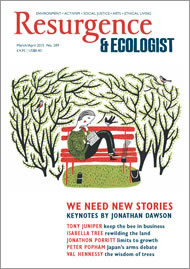It’s a bold title. Even by her standards, Naomi Klein is writing with a new sense of urgency in This Changes Everything. After her sharp critiques of globalised business (No Logo) and the barbarism of austerity (The Shock Doctrine), Klein has published what she has called her most difficult work to date, arguing not only that deregulated capitalism has accelerated the climate crisis, but also that it makes all solutions impossible. Her earlier works were journalism. This wants to be the manifesto for a movement. And we “have only a decade” to act on it.
Klein tells us that the climate crisis is mainly the result of rotten luck. Just as we got a proper grasp on the greenhouse effect, neoliberalism set a global agenda that makes obvious solutions, such as setting caps on carbon emissions, impossible. Governmental intervention in free markets remains political heresy to this day. But if we want to keep a habitable planet, this is what needs to change, quickly.
This Changes Everything is at once a deeply pessimistic look at the state of the world, and an optimistic ode to the capacity for change. To smooth out this tension, Klein takes a few uncharacteristic rhetorical short cuts. Her central conceit is to paint climate change as a black-and-white issue of us vs. them, turning capitalists into pantomime villains to be slain by the public. The dichotomy seeps through every chapter. You can barely read a dozen pages without someone or something or somewhere “going to war” on someone or something or somewhere.
In driving this wedge between the public (translation: the Left) and the neoliberals, Klein leaves herself open to the criticism that her argument is primarily ideologically led. Indeed, she admits to it in her introduction: “As part of the project of getting our emissions down … we once again have the chance to advance policies that dramatically improve lives, close the gap between rich and poor, create huge numbers of good jobs, and reinvigorate democracy from the ground up.”
Whether or not Klein is honest in her intentions, it’s still an own goal for right-wingers who see the green movement as a plot for handwringing commies to destroy global markets. More pantomime villains. In “Decade Zero”, as Klein calls it, this is the sort of thing we need to leave behind as soon as possible, not exacerbate.
It’s also easy to wonder if this division is as clear-cut as Klein would have us believe. Most readers will identify with the good guys, but how many of us so unflinchingly examine ourselves in the same way that Klein examines the climate movement? Conspicuous by its absence is much guidance on why we would expect the average Westerner to democratically relinquish the comforts of overconsumption.
Klein’s version of the public would probably vote for a government that cracked down on corporate tax avoidance. But how many in the UK would vote for a government that also raised taxes on budget weekend flights to Venice? When advocating a completely democratic, bottom-up climate revolution, this is a crucial question. Framing the issue as a war between the public and the capitalists makes for a digestible (and convincing) argument, but it fails to acknowledge the war that we also to have to fight within ourselves. It is also an uncomfortable framework for a book that calls for unprecedented global cooperation.
But whatever criticism we might have about issues that it leaves out or simplifies, This Changes Everything is exactly correct on the ‘big picture’ stuff. Klein isn’t in the business of making arguments more palatable; nor is she flinching from unsavoury conclusions. Alongside her critiques of free-market saviours and hubristic geo-engineers, she points some of her harshest words at the dilly-dallying green movement itself. There are no sacred cows in her pursuit of truth, clarity and actual solutions.
Always present is Klein’s ability to boil things down to uncompromising simplicity, and her maths on the amount of carbon in proven fossil-fuel reserves against what we can ‘safely’ burn is bulletproof. It leaves us no choice but to share her view that doing anything other than keeping fossil fuels in the ground is pointless. It’s then difficult to say anything other than that this puts us in mortal opposition to the self-interest of fossil-fuel companies. The only room for doubt is the way in which she frames it, not the substance of her conclusions. Klein forces us to think big and asks us to fight even bigger, but she shows us that to settle for anything less is to settle for the worst of the green movement’s own warnings.







